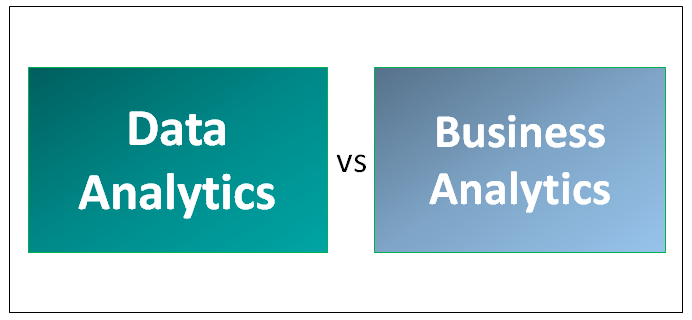Is Data Analyst and Business Analyst the Same Thing?
A data analyst and a business analyst are two
different roles. The main difference between the two is that a data analyst is
more focused on analyzing the data and working with it, while a business
analyst is more focused on understanding the needs of the people using the
data. For example, if you have an online store, your business analysts will do
research about what kind of products people want to buy from you or what kind
of things people like about your company's website design. Then they'll make
recommendations based on their findings so that you can improve your website in
ways that will benefit both customers and employees alike.
There are two
distinct roles: a data analyst and a business analyst. Both of them help guide
the company in its quest for growth, but each contributes to that growth in
their own way.
Data analysts
focus on gathering information from sources outside of the company, like
consumer surveys or social media analysis, while business analysts use more
internal data sources such as financial reports or performance metrics. These
two groups often work together to create strategies that can help companies
improve their bottom line by analyzing consumer trends and customer feedback,
so it's important for businesses to know what these roles entail before hiring
one individual over another.
1. What is the difference between a data analyst
and a business analyst?
Is a data analyst
the same thing as a business analyst? Not quite. While they definitely have
similarities, the core focus of each job makes them different.
What is the core
focus of data analyst? A data analyst focuses on helping companies make better
business decisions by analyzing large amounts of data. This means that they
spend most of their time looking at reports and metrics to find trends and
patterns, as well as creating visualizations for presentations.
Tools that data
analyst use such as Microsoft Excel and Tableau are used to analyze data and
create visualizations. They also use other tools like SQL and R to
programmatically extract data from a database or website.
What is the core
focus of a business analyst? Business analysts are focused on improving company
operations through user research, usability testing and other methods of
collecting feedback from customers. They are also responsible for ensuring that
the business processes and systems are working properly, as well as making sure
that they are aligned with company goals.
Tools that
business analyst use are the same as those used by data scientists, but they
focus more on using these tools to analyze large amounts of data and create
reports that can be used to make business decisions. A common tool in this
field is Microsoft Excel, which can be used for analyzing data or creating
visualizations.
With that said, if
you're trying to decide between the two yourself, it's important to understand
the key differences between these roles so you can make an informed decision on
which one is right for you.
2. What are the duties of a data analyst?
Data analysts are
responsible for collecting, organizing and analyzing data. This involves a lot
of number crunching, but also a lot of communication with stakeholders. Data
analysts must be able to analyze large amounts of data quickly in order to
identify trends.
They also help
create reports based on analysis so that management can make informed decisions
about the company’s direction or plan for future growth. It is important for a
data analyst to communicate their findings effectively through graphs and
charts as well as written reports so that everyone at the company understands
where their efforts are going and what they should do next (or change).
3. What are the duties of a business analyst?
Business analysts
are responsible for gathering requirements to help the business make better
decisions. They also help businesses to improve their processes and systems by
analyzing data. Business analysts often work with customers, users, and other
stakeholders to understand how a business can be improved.
Business analysts
may create business process diagrams (also known as flowcharts) that show the
steps in each process so that they can be analyzed or redesigned. This will
involve interviewing managers or employees in different departments so that you
know what each process looks like on ground level. The purpose of this process
is often to reduce costs or increase productivity by improving efficiency
within an organization's operations.
4. What are some skills that are common to both
data analysts and business analysts?
Both data analysts
and business analysts should have strong problem-solving skills. They need to
be able to identify issues and come up with solutions for them. They also need
to be able to see the big picture and make decisions based on what they learn,
which will affect how their company operates.
Business analysts
often have good communication skills because they need to work closely with
other members of their team in order to ask questions or pass along
information. Data analysts may also need those same skills because they may be
working with a small group of people who are experts in specific areas of
interest, such as data visualization or modeling algorithms.
In addition, both
types of professionals will benefit from having strong attention-to-detail when
looking at numbers and figures that aren't necessarily relevant but could still
help them solve problems down the road!
5. What are some of the benefits of being a data
analyst?
·
Data analysts are
in demand
The data analyst
industry is growing at a rapid rate, and the demand for data analysts is
expected to increase by 20% over the next 10 years. If you're looking for work
that will not only pay well, but also provide plenty of opportunity for career
advancement and flexibility, then this may be a good option for you to
consider.
·
Data analysts are
well paid
Data analysts make
an average salary of $80k per year ($40k more than the national average). This
means that you will have more financial stability than most other workers—and
with your high salary comes freedom from workplace stress! You'll be able to
spend your extra cash on all kinds of things: vacations; buying new clothes;
eating out at restaurants...the list goes on and on!
·
Data analysts can
work from home
One major benefit
of being a data analyst is that many companies allow employees who work from
home (or remotely) full access
6. What are some of the benefits of being a
business analyst?
The benefits are
many, and they vary depending on the company you work for. Some benefits
include:
- ·
A competitive
salary.
- ·
A comprehensive
benefits package (e.g., health insurance, dental coverage).
- ·
Opportunities for
advancement or promotion within the company.
- ·
Flexible working
hours and telecommuting options.
Their salary can
be anywhere from $45,000 to $65,000. A business analyst may also receive
bonuses and stock options.
Their benefits
package typically includes health and dental insurance, paid holidays and sick
days. They may also receive a retirement plan with matching contributions from
their employer. In addition to these benefits, business analysts are often
given the opportunity to advance within their company or move on to another
position within six months of starting work.
Flexible working
hours and telecommuting options means that business analysts can work from
home, allowing them to spend more time with their family. They may also be able
to choose when they start and end the day.
Another benefit of
being a business analyst is that you'll learn how all parts of an organization
interconnect—and how each department functions within its own bubble but also
makes up part of an overall structure. This insight is invaluable for anyone
who wants to advance in their career or start their own company someday!
7. What are the benefits of having a data analyst
and business analyst in a organization?
Data analysts, who
are often responsible for data cleansing and management, can help an
organization make more informed decisions by analyzing the data they have
available. Data analysts work with a lot of different types of data—social
media analytics, market research surveys, sales figures—to find trends and
identify trends that can be used to improve the business as a whole. Business
analysts also provide important insight into how well the company is doing in
terms of its performance metrics, but their focus is more on the impact those
metrics will have on short-term financial gains or losses than it is about
long-term strategy.
Business analysts
help businesses make better business decisions by developing models based on
historical information about their customers' buying habits so that executives
know what products might sell well in which markets (or even predict potential
problems). They also help executives understand what kind of products would
appeal best to their target audience in various regions across the country so
they can plan accordingly when making future investments in advertising
campaigns or new product development teams.
In Summary
Data analytics is
the use of statistical techniques, models and algorithms to extract insight
from data. Business analysts, on the other hand, use their knowledge of
business processes and systems to help organizations make better decisions
using data.
Business analysts
are often tasked with investigating problems and identifying solutions; they
may also produce written reports explaining what they've found. Data analysts
don't always produce such reports—and they're not necessarily concerned with
solving problems as much as analyzing them.
In many cases, a
business analyst may be able to do all of these things without being a trained
statistician or computer scientist (although it doesn't hurt!). In other
cases—particularly when you're dealing with very large datasets that require sophisticated
tools for analysis—you'll need someone who's an expert in statistics or
computer science in order to get accurate results for your company's needs.'
Conclusion
Data analysts and
business analysts are two different types of job roles. While a business
analyst is responsible for gathering information related to a particular
business problem or issue and determining what possible solutions exist, a data
analyst focuses on collecting and analyzing information from various sources.
Both positions involve analyzing data in order to help make better decisions;
however, they do so in different ways.


